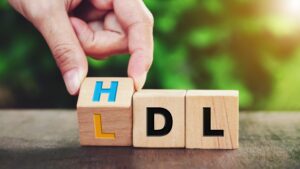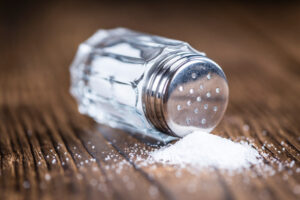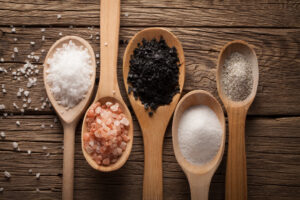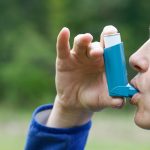April 3, 2024
For many years, it’s been known that a diet high in salt can increase your blood pressure and your risk for heart disease. But does salt affect cholesterol?
Here’s more about the link between salt and cholesterol and how to request an appointment with Healthcare Associates of Texas if you need help managing your cholesterol levels.
 What is cholesterol?
What is cholesterol?
When we talk about cholesterol levels in the body, we are referring to blood cholesterol. Blood cholesterol is a fat-like substance that is made by your liver. It plays an important role in the production of hormones and digestive fluids.1 Cholesterol that comes from the foods you eat is called dietary cholesterol.
Cholesterol can be good or bad.
Good cholesterol is high-density lipoprotein (HDL) cholesterol. High levels of HDL cholesterol are good for your overall health, as it can reduce your risk for conditions including heart disease and stroke.1
Bad cholesterol is low-density lipoprotein (LDL) cholesterol. High levels of LDL cholesterol can cause plaque to build up on the walls of your arteries. Over time, high LDL cholesterol can lead to heart disease and stroke.1
Total cholesterol refers to the total amount of HDL, LDL, and triglycerides. Triglycerides are a type of fat in the blood that is used for energy. However, high triglycerides with an imbalance of HDL and/or LDL cholesterol can also increase your risk for heart problems.1
 Is salt bad for cholesterol?
Is salt bad for cholesterol?
Salt is a combination of chloride and sodium. According to the FDA, more than 70% of the sodium consumed by people in the U.S. comes from processed foods and not from table salt that is added to foods while cooking.2
In a recent study, researchers looked at the effects of high- and low-sodium diets on several biomarkers, including cholesterol. They found that participants who reduced their salt intake from 11.5 grams per day to 3.8 grams per day experienced an increase in bad LDL cholesterol by nearly 3%.3 A reduction in salt intake did not affect HDL cholesterol.
Though high amounts of salt may not be bad for your cholesterol, it does increase your blood pressure and your risk for heart disease and stroke. The FDA suggests limiting the amount of sodium you eat to less than 2,300 milligrams per day (or one teaspoon of table salt), which is the recommended Daily Value for this element.2
How does salt interact with cholesterol in the body?
Salt itself may not raise your cholesterol. However, many foods that DO raise your cholesterol usually contain high amounts of sodium. Therefore, it is understandable why you may wonder whether too much salt can affect cholesterol.
Foods that are high in saturated fats are the main culprit behind high LDL cholesterol.4 Pizza, fried foods, and processed meats are some foods that contain high amounts of saturated fats. These foods also typically contain high amounts of salt.
 Are certain types of salt better than others for cholesterol?
Are certain types of salt better than others for cholesterol?
All salts contain sodium. Therefore, if you’re trying to reduce your sodium intake, choosing a specific salt will not have an impact on your cholesterol. However, some salts do have certain other health benefits over others. For instance, sea salts contain trace amounts of other nutrients, including zinc, iron, and potassium.
If your goal is to avoid food additives, steer clear of conventional table salts—many of which contain a chemical called potassium ferrocyanide.5 This additive is an anti-caking agent used to prevent lumps from forming in salt. It has been linked to side effects, including nausea, vomiting, and diarrhea.6
Regardless of which salt you choose, read its nutrition label to make sure it contains ingredients you feel comfortable eating.
What are the short-term effects of high salt intake?
Bloating, excessive thirst, and a spike in blood pressure are some short-term effects you may experience after eating a meal high in salt. You may also urinate frequently for the next several hours and overnight. This happens because your kidneys must work harder to get rid of the extra salt.
Your doctor may tell you it’s okay to enjoy certain high-salt foods in moderation, such as baked goods, pizza, and your other favorites. However, eating these foods regularly could harm your overall health and increase your risk for weight gain, heart disease, and stroke.
Speak with your doctor if you need help developing a healthy meal and nutrition plan. Your doctor can review your medical history and talk to you about the best foods to eat based on your health status.
Healthy tips on managing cholesterol and using salt
The best way to avoid any health problems related to salt is to limit your intake to no more than 2,300 milligrams per day.2 While it’s been established that high salt intake is not directly linked to high cholesterol, limiting the amount you eat can help you maintain good general health.
Follow these tips to manage your cholesterol when eating sodium and salt:7
- Eat foods high in soluble fiber. These foods promote digestion and can prevent your body from absorbing bad LDL cholesterol. Beans, fruits, vegetables, and whole grains like quinoa and oats are examples of foods high in fiber.
- Eat lots of fruits and vegetables. Fruits and veggies are high in fiber. They also contain several other nutrients and plant compounds that naturally lower bad LDL levels.
- Eat fatty fish. Salmon, mackerel, tuna, and sardines are some of the many types of fatty fish that are high in omega-3 fatty acids. Omega-3s are heart-healthy acids and foods that can increase your HDL levels.
- Eat fewer processed foods. Many processed foods, including frozen foods and deli meats, contain excessively high amounts of salt and sodium. Stop eating these foods or reduce your intake as much as possible.
- Use healthier cooking oils. Replace butter and margarine with olive and avocado oils. Butter and butter products tend to be high in saturated fats, while olive and avocado oils offer a greater number of health benefits.
- Replace salt with herbs and spices. Stop using table salt and experiment with using herbs and spices to flavor your foods instead. Cilantro, basil, parsley, paprika, garlic, and cumin are some of the many delicious and nutritious seasonings you can try.
Don’t hesitate to talk to your doctor if you have concerns about your cholesterol and/or salt intake. Your doctor can work with you to lower your cholesterol and may even refer you to a nutritionist or dietician to work with you on improving your nutrition.
Request an appointment with Healthcare Associates of Texas today to receive treatment for any medical condition, including high cholesterol. We offer a variety of primary care services, including wellness exams, screenings, and more.
References
- About Cholesterol. (2023, March 30). Centers for Disease Control and Prevention. https://www.cdc.gov/cholesterol/about.htm
- Sodium in Your Diet. (2022, February 25). U.S. Food and Drug Administration. https://www.fda.gov/food/nutrition-education-resources-materials/sodium-your-diet
- Graudal, N., Hubeck-Graudal, T., & Jürgens, G. (2020). Effects of low sodium diet versus high sodium diet on blood pressure, renin, aldosterone, catecholamines, cholesterol, and triglyceride. The Cochrane Library, 2021(8). https://doi.org/10.1002/14651858.cd004022.pub5
- Facts about saturated fats. (2022, June 22). National Library of Medicine. https://medlineplus.gov/ency/patientinstructions/000838.htm
- Min, N., Chen, Y., Han, Y., Ma, S., Liu, J., & Chen, X. (2019). Determination of potassium ferrocyanide in table salt and salted food using a water-soluble fluorescent silicon quantum dots. Food Chemistry, 288, 248–255. https://doi.org/10.1016/j.foodchem.2019.02.111
- Potassium Ferricyanide. (2009, October 6). Reagents, Inc. https://westliberty.edu/health-and-safety/files/2012/08/Potassium-Ferricyanide.pdf
- How to Lower Cholesterol with Diet (2021, May 5). National Library of Medicine. https://medlineplus.gov/howtolowercholesterolwithdiet.html
DISCLAIMER
The information featured in this site is general in nature. The site provides health information designed to complement your personal health management. It does not provide medical advice or health services and is not meant to replace professional advice or imply coverage of specific clinical services or products. The inclusion of links to other web sites does not imply any endorsement of the material on such websites.



